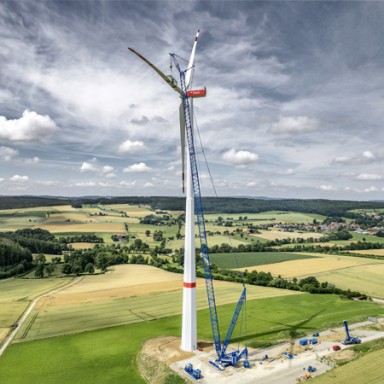Latest news
News and press releases
02/20/2026Press releases
Liebherr delivers Ryan Mining Inc. its first HS 8300.2 dragline
Ryan Mining Inc. has taken delivery of its first Liebherr HS 8300.2 dragline. This acquisition not only marks the beginning of a strongpartnership between Ryan Mining Inc. and Liebherr, but it notes an important milestone in Ryan Mining’scontinued investment in high-performance mining equipment.
Find out more02/20/2026Press releases
Liebherr completes crane raise at The Port of Grangemouth
Liebherr Container Cranes Ltd. is proud to announce the successful completion of a major crane raise project at Forth Ports Grangemouth. Two ship-to-shore (STS) gantry cranes have had their lift height increased by 2.2 metres, unlocking enhanced operational capabilities for Scotland’s largest container port.
Find out more02/20/2026News
Foundation stone laid for Liebherr production facility in Saudi Arabia
New site in King Abdullah Economic City strengthens German-Saudi industrial cooperation and local production capabilities.
Find out more02/19/2026Press releases
Liebherr at ReMA 2026 Convention & Expo
Liebherr’s earthmoving and material handling technology team will exhibit at the ReMA 2026 Convention and Exposition showcasing the LH 60 Industry E material handler and the L 550 XPower wheel loader at booth #A6.
Find out more02/19/2026Press releases
Liebherr supports construction of the Cascata D`Otro Mountain Lodge
The construction of the Cascata D’Otro Mountain Lodge in Alagna Valsesia was successfully supported by a Liebherr 81 K.1 fast-erecting crane. The project combined high-quality tourism development with sensitive integration into the alpine landscape. Thanks to its rapid set-up and finely adjustable configurations, the Liebherr crane proved to be the ideal solution for the logistical challenges of building in a narrow mountain valley.
Find out more
Magazines by Liebherr
Exhibitions and events
02/22/2026 - 02/25/2026Exhibitions
SME Mine Exchange Annual Conference
smeannualconference.org02/22/2026 - 02/26/2026Exhibitions
www.euroshop.de03/03/2026 - 03/07/2026Exhibitions
www.aapa-ports.org/index.aspx03/03/2026 - 03/07/2026Exhibitions
03/03/2026 - 03/07/2026Exhibitions
CONEXPO-CON AGG - deep foundation outdoor booth
www.conexpoconagg.com/
Continue reading

Our year in figures
Published every year, our Annual Report looks back in detail at the past financial year. Find out facts, figures and stories from the Group.

Shaping digital transformation
Whether it is IoT, machine learning or cloud applications – discover Liebherr’s wide range of digital solutions.

All about wind energy
As a strong partner to the wind industry, Liebherr offers the right solution for a wide range of requirements.

Social Media
Find your community among Liebherr's many social media channels.